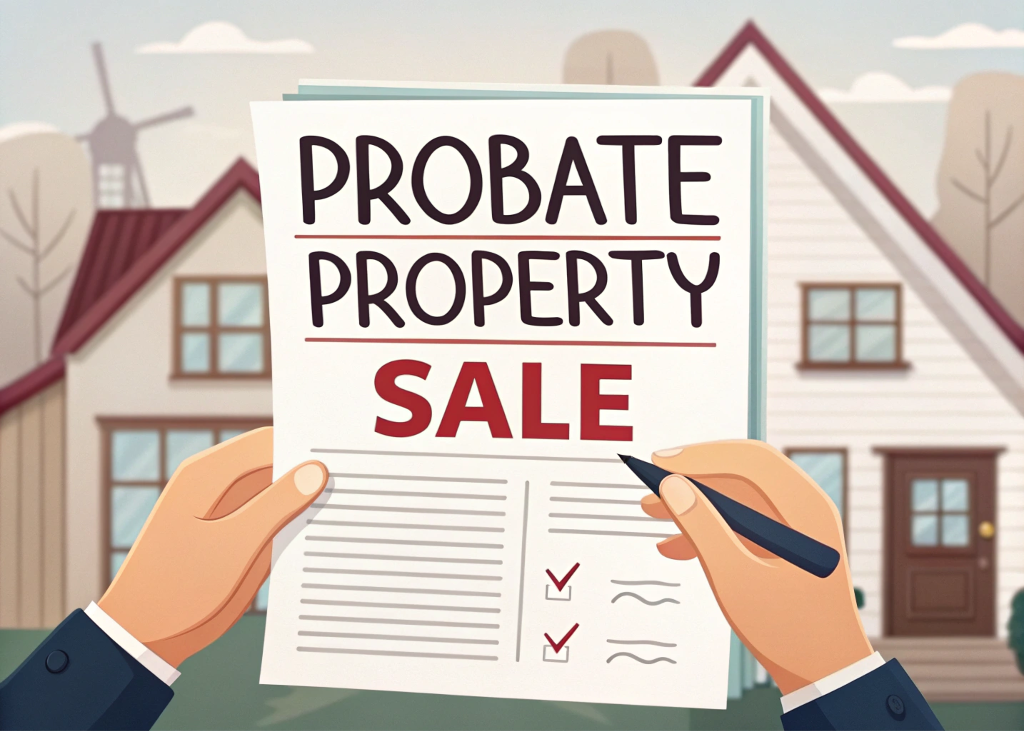*updated 4-1-2025
You’ve lost a parent, and now you’re trying to figure out what happens to their house.
It’s a tough situation, and if you’re like most people, you’re probably wondering: Can I sell my deceased parents house without probate?
The short answer? Maybe not.
In Texas, there are actually ways to sell a Texas house in probate without dragging through the court system—but only if certain things are in place.
If your parent set up a Transfer on Death Deed (TODD) or if you qualify for an affidavit of heirship, you might be able to skip the legal headache and move forward faster to sell.
But here’s the catch: If those documents aren’t already in place, you could be looking at months—or even years—of probate delays before you can sell. And that’s where things get tricky.

So, what’s the best way to know where you stand?
Let’s break it all down, step by step, so you can figure out the fastest and easiest way to sell your inherited home without probate in 2025.
This comprehensive guide will provide an overview of Texas probate laws and your options when selling inherited property without probate.
Understanding Probate in Texas 2025
Probate is a legal process during which a probate court validates a person’s will and guarantees all assets are distributed according to the Texas Estates Code. The probate court determines heirs, ensures title is not clouded, all debts are paid and oversees the distribution of the remaining assets. This system safeguards the rights of all interested parties, including family members and creditors, and assures compliance with all federal and state laws.
Probate proceedings in Texas often take a year, complicating and prolonging the sale of any real property. During probate, all of the deceased person’s assets remains part of the estate until probate is completed, severely limiting your ability to transfer ownership or sell the home outright. As experienced probate attorneys share insights on selling inherited property.
The Texas Estates Code allows for two different types of probate proceedings: Formal probate requires a probate judge to authorize all estate decisions whereas independent administration like in a a trust allows an executor allows an executor to handle estate distribution on his/her own.
Independent administration is generally quicker and easier, but requires that an executor with independent administration be named in the will. For those interested, a general guide on probate laws can be found online.

Circumstances Allowing Sale of a Property Without Probate
Probate often holds a property in limbo, but under certain circumstances a property can be sold in Texas without undergoing the full probate process.
✅ A transfer on death deed, or TODD, is a legal document which allows a property owner to give a beneficiary designation to who will obtain ownership of the property immediately upon the owner’s death. This document must be filed with the county court clerk by the current owner before their death. With a TODD, the beneficiary can claim property ownership without court involvement.
✅ Texas is a community property state, allowing a surviving spouse or other joint tenants to own property together. However, in order for the property to automatically transfer to the surviving owner, a joint tenancy with rights of survivorship agreement must have been notarized and filed before any owner’s death. This agreement enables the property transfer to the surviving owner without probate.
✅ A revocable living trust allows a person to place assets, such as a home, in a trust during their lifetime. Upon their death, all listed assets bypass probate and go directly to a named trustee. The trust specifies how assets are to be managed after the owner’s death and can be updated or altered during their lifetime. The flip side is an irrevocable trust which would require a different series of steps for a grantor to sell a house in an irrevocable trust before death.
✅ In some instances, an estate is considered small enough that probate is not necessary. Under Texas law, if there is no will and the estate is valued at $75,000 or less (not including the homestead or other exempt assets) a small estate affidavit (SEA) may be filed. This affidavit is filed with the probate court but, if approved, estate administration proceeds without court approval. Additional requirements for an SEA are found in the Texas Estates Code, chapter 205.
✅ In the absence of a will, an an affidavit of heirship can sometimes transfer real property to an heir without probate. The affidavit must be signed in the presence of a notary public by someone who knew the deceased and their family history but is not an heir. It then needs to be filed with the real property records in the county where the decedent’s property is located. An affidavit of heirship only transfers real property to an heir, not any monetary funds.
Legal Procedures and Documentation
In order to sell a deceased person’s estate, all legal procedures and documentation must be compliant with state laws. A valid will provides a crucial advantage in efficient estate administration, providing a framework for the executor. Without a will, the state of Texas intestate succession laws are used to determine heirs and probate is utilized.
After a death, a personal representative or executor of the estate will be appointed either by the probate court or the will. This representative has the duty of properly managing and distributing the estate. It is important to note when planning that while an executor and power of attorney both have power to make decisions on a person’s behalf, power of attorney privilege ceases upon death and the executor takes over thereafter.
Once an estate administration plan is adopted, the necessary documents must be presented in order to obtain possession of the property. The decedent’s death certificate is obligatory.
Other legal documents related to the deceased or the property, such as wills, trust documents, affidavits or deeds, may also be required. A lawyer can advise on which documents are mandatory to ensure compliance with property transfer laws.
Even without formal probate, there are some decisions that may still require court approval.
Disagreement amongst heirs regarding the estate or any dispute regarding the ownership of the property can necessitate court involvement.
Proper planning on the part of the parent and the heirs plus accurate documentation will greatly reduce the chance of court involvement in the administration of the estate.
Financial and Tax Considerations of Probate
There are many expenses and tax implications to consider when selling an inherited property.
All outstanding debts of the decedent must be settled, including any mortgage or liens on the property.
Any liens on a property will complicate and perhaps delay a sale. There are also expenses related to holding the home. For example, homeowner’s insurance should be kept current for the property until it is sold to reduce liability risks.
Texas does not currently impose estate nor inheritance taxes, but federal estate taxes may apply to large estates. Capital gains tax will be collected if the property was sold at a profit, which is calculated based on the fair market value of the property at the time of inheritance.
A tax professional can help you plan ahead for these expenses. All property taxes should be current to avoid any penalties; any remaining property taxes will be due at closing.
Life insurance policies left by the deceased may ease some of these financial obligations. These policies can provide funds to help settle debts or pay for the expenses related to the sale.
However, life insurance payouts are sometimes delayed and you may be responsible for expenses in the meantime.
Preparing the Property for Sale
Once the property has been legally granted to you as an heir, a proper cleaning and inspection of the property will promote an efficient home sale.
A professional home inspector can recommend needed repairs and improvements to enhance marketability of the home and possibly garner a higher sale amount.
A reputable title company can inspect the title for validation purposes and notify you of any liens that need to be addressed before probate and county court can approve a house sale.
When marketing the property, you must reach out to potential buyers, present the best face of the property and be open about any problems. There are multiple marketing tools to reach interested parties such as the MLS, classified ads, real estate websites and even social media. Listing a clean and primed home increases interest and transparency with public records and acknowledgment of potential property issues engenders trust between you and the buyer.
Work with Probate Professionals
Hiring trustworthy professionals plays an integral part in a strategic sales plan.
A real estate agent experienced in probate sales will provide invaluable assistance when navigating through the legal intricacies of a personal property sale. An agent also provides guidance on pricing and marketing strategies, maximizing the potential value of the home.
Sometimes situations can get messy really quick.
A real estate attorney or probate lawyer will interpret state laws, handle legal procedures and offer legal advice regarding your specific circumstances throughout the acquisition process. By using their expertise to assist through the legal procedures, pitfalls can be avoided that might delay a estate property sale.
When selecting a real estate agent or attorney, it is critical to choose someone who has a sound reputation and significant experience. Selecting local professionals will ensure their advice is relevant to your area.

Selling Options for Inherited Property
There are two primary types of real estate sales: traditional sales and cash offers.
A traditional sale will be listed on the real estate market usually MLS and involves a traditional purchase with inspections, negotiating, loan approvals and closing.
Traditional sales generally sell at market value, but can be complex and time-consuming. Selling directly to a legitimate cash buyer will expedite and simplify the process, but at the cost of a lower sale price.
At Bright Bid Homes, and other companies that are cash home buyers, offer “sell my house fast” cash purchases on homes. After reaching out to our team about selling the probate property, we will quickly send a fair cash offer, often in less than a day.
If the offer is accepted, we move forward with closing and barring any difficulties, may take possession of the home within weeks and get cash in your pocket quickly. We buy houses in any condition, negating repair expenses for selling inherited properties.
The cash offer option is normally less than full market value, but the speed and convenience of a quick sale offer is often desirable for estate settlements since it moves the property rapidly.
Navigating Family Dynamics and Interested Parties
Selling a parent’s house is emotionally taxing but it is important to coordinate with siblings and other heirs.
As Real estate experts discuss common inheritance disputes and solutions, providing regular updates decreases the chances of misunderstandings and provides ways to reach consensus in a cordial manner.
If disagreements are left unresolved, the courts may get involved and the entire process becomes complicated.
Be aware of claims from other interested parties in the estate, such as creditors or other potential heirs who might overbid for the property. If such claims are made, a probate attorney can help navigate disputes and direct you toward the proper legal steps and documents needed to protect your interests and avoid any potential probate scams that lurk.
Final Thoughts On Estate Probate
The sale of an inherited property can be complex.
But, there is a path forward to pursue.
Selling a deceased parent’s house without probate in Texas is possible under certain conditions. Understanding your options and responsibilities is essential.
Methods like transfer on death deeds, joint tenancy, and affidavits can facilitate an easier home selling process.
However, it is crucial to understand legal requirements and comply with state of Texas laws to ensure a proper transaction. Seeking professional advice can alleviate stress and prevent legal complications, allowing you to honor your loved one’s legacy while making informed decisions.
If you’re considering selling an inherited property and need expert guidance, our team of professionals is here to help.
Contact us today for personalized assistance with Texas real estate laws and ensuring an easier sale.

**About the Author: Hilary Schultz is a licensed Texas Realtor and real estate professional — is a leading authority on DFW metroplex real estate. Hilary is a member of the executive board of her local Texas PTA and active member of the Texas community. Along with her husband Patrick, they have combined 40 years of experience with over 2700 real estate transactions completed. Read our online google reviews to understand our mission to help the Texas community and provide homeowners with valuable insights, guidance, and a personalized experience through the home selling process. Let us serve you and help to navigate probate on your real estate journey.
*** DISCLAIMER: This article is for informational purposes only and does not constitute legal, financial, or real estate advice. Probate cases and the court-supervised process of transferring legal ownership of a deceased person’s house vary by state, and local laws may affect the sale process and the rightful heirs.
Laws regarding estate assets, joint ownership, and the transfer of assets—including bank accounts and real estate property—are subject to change. We make no representations or warranties about the accuracy, completeness, or reliability of the information provided. Any reliance on this content is strictly at your own risk.
Before proceeding with the sale of the property, resolving estate debts, or addressing title issues, we strongly recommend consulting legal professionals with expertise in practice areas such as probate, right of survivorship, and executor sell property responsibilities. Whether you are a successor trustee, an executor, or a beneficiary, seeking guidance ensures a smooth transaction and minimizes legal consequences.
For a free consultation regarding probate laws in Texas or other states, consult an attorney familiar with court proceedings, necessary paperwork, and mortgage payments during probate.
